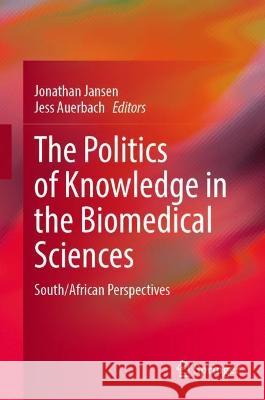The Politics of Knowledge in the Biomedical Sciences: South/African Perspectives » książka
The Politics of Knowledge in the Biomedical Sciences: South/African Perspectives
ISBN-13: 9783031319129 / Angielski
In the wake of the decolonization movement in South Africa and around the world, this edited work presents fresh evidence and advances new arguments on the politics and economics of colonial biomedical knowledge in South Africa and other parts of the African continent. Covering a richly diverse set of fields---including human genetics, obstetrics, occupational therapy, medical photography and the vaccine sciences---the book demonstrates the troubled histories and the enduring effects of imperial knowledge decades since the end of colonial rule and apartheid. This is a valuable text on the politics of the biomedical sciences written from the perspective of the African continent, and at the same time it revisits knowledge/power relationships between the majority (“global South”) and minority (“global north”) words in a historical perspective and in their contemporary expression in the disciplines. The immediate benefit is a reference resource for medical science researchers, and a teaching text for senior undergraduate and postgraduate students. The book is further composed as an accessible, readable and interesting text on politics and medicine in Africa for the discerning lay reader.
In the wake of the decolonization movement in South Africa and around the world, this edited work presents fresh evidence and advances new arguments on the politics and economics of colonial biomedical knowledge in South Africa and other parts of the African continent. Covering a richly diverse set of fields---including human genetics, obstetrics, occupational therapy, medical photography and the vaccine sciences---the book demonstrates the troubled histories and the enduring effects of imperial knowledge decades since the end of colonial rule and apartheid. This is a valuable text on the politics of the biomedical sciences written from the perspective of the African continent, and at the same time it revisits knowledge/power relationships between the majority (“global South”) and minority (“global north”) words in a historical perspective and in their contemporary expression in the disciplines. The immediate benefit is a reference resource for medical science researchers, and a teaching text for senior undergraduate and postgraduate students. The book is further composed as an accessible, readable and interesting text on politics and medicine in Africa for the discerning lay reader.











